- Home
- Christina Lauren
Twice in a Blue Moon
Twice in a Blue Moon Read online
PRAISE FOR THE NOVELS OF
Christina Lauren
“What a joyful, warm, touching book! I laughed so hard I cried more than once, I felt the embrace of Olive’s huge, loving, complicated, hilarious family, and my heart soared at the ending. This is the book to read if you want to smile so hard your face hurts.”
—Jasmine Guillory, New York Times bestselling author of The Proposal, on The Unhoneymooners
“Witty and downright hilarious, with just the right amount of heart, The Unhoneymooners is a perfect feel-good romantic comedy. Prepare to laugh and smile from cover to cover.”
—Helen Hoang, author of The Bride Test, on The Unhoneymooners
“Sassy and appealing, writing duo Lauren’s (My Favorite Half-Night Stand) latest endeavor is sure to please. A perfect read for the beach or poolside, this is one hot summer story not to miss!”
—Library Journal on The Unhoneymooners (starred review)
“A funny, sexy page-turner that warns: Keep your friends close and their avatars closer.”
—Kirkus Reviews on My Favorite Half-Night Stand
“This is a messy and sexy look at digital dating that feels fresh and exciting.”
—Publishers Weekly on My Favorite Half-Night Stand (starred review)
“You can never go wrong with a Christina Lauren novel… a delectable, moving take on modern dating reminding us all that when it comes to intoxicating, sexy, playful romance that has its finger on the pulse of contemporary love, this duo always swipes right.”
—Entertainment Weekly on My Favorite Half-Night Stand
“With exuberant humor and unforgettable characters, this romantic comedy is a standout.”
—Kirkus Reviews on Josh and Hazel’s Guide to Not Dating (starred review)
“The story skips along… propelled by rom-com momentum and charm.”
—The New York Times Book Review on Josh and
Hazel’s Guide to Not Dating
“Lauren has penned a hilariously zany and heartfelt novel… the story is sure to please readers looking for a fun-filled novel to escape everyday life with.”
—Booklist on Josh and Hazel’s Guide to Not Dating
“From Lauren’s wit to her love of wordplay and literature, to swoony love scenes [and] heroines who learn to set aside their own self-doubts… Lauren writes of the bittersweet pangs of love and loss with piercing clarity.”
—Entertainment Weekly on Love and Other Words
“A triumph… a true joy from start to finish.”
—Kristin Harmel, internationally bestselling author of The Room on Rue Amélie, on Love and Other Words
“Lauren’s standalone brims with authentic characters and a captivating plot.”
—Publishers Weekly on Roomies (starred review)
“Delightful.”
—People on Roomies
“At turns hilarious and gut-wrenching, this is a tremendously fun slow burn.”
—The Washington Post on Dating You / Hating You (a Best Romance of 2017 selection)
“Truly a romance for the twenty-first century.… A smart, sexy romance for readers who thrive on girl power.”
—Kirkus Reviews on Dating You / Hating You (starred review)
“Christina Lauren hilariously depicts modern dating.”
—Us Weekly on Dating You / Hating You
Thank you for downloading this Simon & Schuster ebook.
Get a FREE ebook when you join our mailing list. Plus, get updates on new releases, deals, recommended reads, and more from Simon & Schuster. Click below to sign up and see terms and conditions.
CLICK HERE TO SIGN UP
Already a subscriber? Provide your email again so we can register this ebook and send you more of what you like to read. You will continue to receive exclusive offers in your inbox.
If you have ever gone to the woods with me, I must love you very much.
From How I Go to the Woods by Mary Oliver
one
JUNE
Fourteen Years Ago
NANA TURNED TO INSPECT the hotel room. Behind her, the curtains drifted closed with a whisper. With her dark, sharp eyes, she surveyed the cream and red decor, the generic paintings, and the television she no doubt found gaudily perched on the otherwise beautiful dresser. Never in my life had I been in a room this fancy, but her gaze, as it touched everything, read Given the cost, I expected more.
Mom had always described this expression as pruney. It fit. My grandmother—only sixty-one—totally looked like a piece of soft dried fruit when she got mad.
As if on cue, she grimaced like she’d just smelled something sour. “Our view is the street. If I wanted to stare at a city street I could have driven to San Francisco.” She blinked away from the dresser to the telephone on the desk, moving toward it with purpose. “We aren’t even on the right side of the building.”
Oakland, to New York, to London, landing just over an hour ago. For the longest leg, our seats were in the middle of a group of five, on the bulkhead row, where we were flanked on one side by a frail older man who immediately fell asleep on Nana’s shoulder and on the other by a mother with an infant. By the time we were finally situated in the hotel room, I just wanted a meal, and a nap, and a tiny patch of quiet away from Nana the Prune.
Mom and I had lived with Nana since I was eight. I knew she had it in her to be a good sport; I’d seen it every day for the past ten years. But right then we were far from home, way out of our comfort zone, and Nana—owner of a small-town café—detested spending her hard-earned money and not getting exactly what she was promised.
I nodded to the window as a very European black taxi zoomed by. “It is a pretty great street, though.”
“I paid for a view of the Thames.” She ran a blunt fingertip down the list of hotel extensions, and my stomach clenched into a ball of guilt at the reminder that this vacation was way more lavish than anything we’d ever done. “And Big Ben.” The tremble of her hand told me exactly how quickly she was calculating what she could have done with that money if we’d stayed somewhere cheaper.
Out of habit, I tugged at a string on the hem of my shirt, wrapping it around my finger until the tip pulsed. Nana batted my hand away before she sat at the desk, heaving an impatient breath as she lifted the phone from its cradle.
“Yes. Hello,” she said. “I’m in room 1288 and I have brought my granddaughter all the way here from—yes, that’s correct, I am Judith Houriet.”
I looked up at her. She’d said Judith, not Jude. Jude Houriet baked pies, served the same regular customers she’d had since she opened her café at nineteen, and never made a fuss when someone couldn’t afford their meal. Judith Houriet was apparently much fancier: she traveled to London with her granddaughter and certainly deserved the view of Big Ben she’d been promised.
“As I was saying,” she continued, “we are here to celebrate her eighteenth birthday, and I specifically booked a room with a view of Big Ben and the Tham—yes.” She turned to me, stage-whispering, “Now I’m on hold.”
Judith didn’t even sound like my nana. Was this what happened when we left the cocoon of our town? This woman in front of me had the same soft curves and stout worker’s hands, but wore a structured black jacket I knew Jude could barely afford, and was missing her ubiquitous yellow gingham apron. Jude wore her hair in a bun with a pencil dug through it; Judith wore her hair blown out and tidy.
When whoever was on the other end returned, I could tell it wasn’t with good news. Nana’s “Well that’s unacceptable,” and “I can assure you I am going to complain,” and “I expect a refund of the difference in room rates,” told me we were out of luck.
She hung up and exhaled long and slow, the way she
did when it had been raining for days, I was bored and testy, and she was at her wits’ end with me. At least this time I knew I wasn’t the reason behind her mood.
“I can’t tell you how grateful I am,” I said quietly. “Even in this room.”
She blew out another breath and looked over at me, softening only slightly. “Well. We’ll see what we can do about it.”
Two weeks with Nana in a tiny hotel room, where she was sure to complain about the poor water pressure or the too-soft mattress or how much everything cost.
But two weeks in London. Two weeks of exploring, of adventure, of cramming in as much experience as I could before my life got small again. Two weeks seeing sights I’d only ever read about in books, or seen on TV. Two weeks watching some of the best theater productions anywhere in the world.
Two weeks of not being in Guerneville.
Dealing with a little pruney was worth it. Standing, I lifted my suitcase onto my bed and began unpacking.
* * *
After a surreal walk across Westminster Bridge and past the towering Big Ben—I could actually feel the chimes through the center of my chest—we ducked into the darkness of a small pub called The Red Lion. Inside, it smelled of stale beer, old grease, and leather. Nana peeked in her purse, making sure she’d converted enough cash for dinner.
A few figures lurked near the bar, yelling at the television, but the only other people there for a meal at five in the evening were a couple of guys seated near the window.
When Nana spoke—strong voice, clear American accent saying, “A table for two, please. Near the window.”—the older of the two men stood abruptly, sending the table screeching toward his companion.
“Across the pond as well?” he called out. He was around Nana’s age, tall and broad, black with a shock of salt-and-pepper hair and a thick mustache. “We just ordered. Please, come join us.”
Nana’s dread over having to socialize with anyone tonight was apparent; it settled across her shoulders in a gentle curve.
She waved away the host, taking the menus from his hand and leading us both to their table by the window.
“Luther Hill.” The older man stretched out his hand to Nana. “This is my grandson, Sam Brandis.”
Nana gingerly shook his hand. “I’m Jude. This is my granddaughter, Tate.”
Luther moved to shake my hand next, but I was hardly paying attention. Sam stood at his side, and just looking at him sent an earthquake rattling down my spine, the way the chimes of Big Ben had reverberated along my bones earlier. If Luther was tall, Sam was a redwood, a skyscraper, wide as a road.
He ducked a little to pull my attention from the expanse of his chest, giving me a smile that I imagined must be cultivated to reassure people that he wasn’t going to break their hand when he shook it.
He pressed his palm to mine and squeezed, carefully. “Hi, Tate.”
He was gorgeous, but just imperfect enough to seem… perfect. His nose had been broken at some point, and healed with a small bump near the bridge. He had a scar through one of his eyebrows and one on his chin—a tiny, indented comma below his lip. But there was something about the shadow he cast, the solid weight of him, and the way he came together—his soft brown hair, wide-set green-brown eyes, and full, smooth mouth—that made my pulse seem to echo in my throat. I felt like I could stare and stare at his face for the rest of the night and still find something new in the morning.
“Hi, Sam.”
Nana’s chair screeched dissonantly across the wooden floor, and I snapped my gaze to where Luther was helping her into her seat. Only two weeks prior, I had ended a three-year relationship with Jesse—the only boy in Guerneville I’d ever considered worthy of affection. Boys were the last thing on my mind.
Weren’t they?
London wasn’t supposed to be about boys. It was about being in a place with museums, and history, and people who were raised in a city rather than in a tiny, damp, redwood-lined river town. It was meant to be about doing every last thing Nana had ever dreamed of doing here. It was about having one fancy adventure before I ducked back into the shadows and began college in Sonoma.
But it seemed Sam didn’t get the mental memo that London wasn’t about him, because although I’d looked away, I could feel the way he was still watching me. And was still holding my hand. In unison, we looked down. His hand felt heavy, like a rock, around mine. Slowly he let go.
We sat together at the cramped table—Nana across from me, Sam to my right. Nana smoothed the linen tablecloth with an inspecting hand, pursing her lips; I could tell she was still mad about the view and barely containing the need to voice it to someone else, to hear them confirm that she was right to be up in arms over this injustice.
In my peripheral vision, I caught Sam’s long fingers as they reached out and engulfed his water glass.
“Well now.” Luther leaned in, pulling a whistling breath in through his nose. “How long have you been in town?”
“We just landed, actually,” I said.
He looked at me, smiling beneath his bushy old-man pornstache. “Where you all from?”
“Guerneville,” I said, clarifying, “about an hour north of San Francisco.”
He dropped a hand on the table so heavily that Nana startled and his water rippled inside the glass. “San Francisco!” Luther’s smile grew wider, flashing a collection of uneven teeth. “I’ve got a friend out there. Ever met a Doug Gilbert?”
Nana hesitated, brows tucking down before saying, “We… no. We’ve not met him.”
“Unless he drives up north for the best blackberry pie in California, we probably haven’t crossed paths.” I said it proudly, but Nana frowned at me like I’d just given them some scandalously identifying information.
Sam’s eyes gleamed with amusement. “I hear San Francisco is a pretty big city, Grandpa.”
“True, true.” Luther laughed at this, at himself. “We have a small farm in Eden, Vermont, just north of Montpelier. Everyone knows everyone there, I suppose.”
“We sure know how that is,” Nana said politely before surreptitiously peeking down at the dinner menu.
I struggled to find something to say, to make us seem as friendly as they were. “What do you farm?”
“Dairy,” Luther told me, his smile encouraging and bright. “And since everyone does it, we also do a bit of sweet corn and apples. We’re here celebrating Sam’s twenty-first birthday, just three days ago.” Luther reached across the table, clutching Sam’s hand. “Time is flying by, I tell you that.”
Nana finally looked back up. “My Tate just graduated from high school.” A tight cringe worked its way down my spine at the way she emphasized my age, glancing pointedly at Sam. He might have been twice my size, but twenty-one is only three years older than eighteen. Going by her expression, you’d think he’d been practically middle-aged. “She’s starting college in the fall.”
Luther coughed wetly into his napkin. “Whereabouts?”
“Sonoma State,” I said.
He seemed to be working on a follow-up question, but Nana impatiently flagged down the waiter. “I’ll have the fish and chips,” she ordered, without waiting for him to come to a full stop at the table. “But if you could put them on separate plates, I’d appreciate it. And a side salad, no tomatoes. Carrots only if they aren’t shredded.”
I caught Sam’s eye and registered the sympathetic amusement there. I wanted to explain that she owns a restaurant but hates eating out. She’s picky enough to make her food perfect, but never trusts anyone else to do the same. After he gave me a small smile, we both looked away.
Nana held up a hand to keep the waiter’s attention from turning to me yet. “And dressing on the side. Also, I’ll have a glass of chardonnay and an ice water. With ice.” She lowered her voice to explain to me—but not so quietly that everyone else didn’t hear it too: “Europeans have a thing about ice. I’ll never understand it.”
With a tiny grimace, the waiter turned to me. “Miss?”
“Fish and chips.” I grinned and handed him my menu.
The waiter left, and a tense, aware silence filled his wake before Luther leaned back in his chair, letting out a roaring laugh. “Well now. I guess we know who the princess is!”
Nana became a prune again. Great.
Sam leaned forward, planting two solid arms on the table. “How long you here for?”
“Two weeks,” Nana told him, pulling her hand sanitizer out of her purse.
“We’re doing a month,” Luther said, and beside him, Sam picked up a piece of bread from the basket at the center of the table and wolfed it down in a single clean bite. I worried they’d ordered a while ago, and our appearance had really delayed the delivery of their meal. “Here for a couple weeks as well,” Luther continued, “then up to the Lake District. Where are you staying in London?”
“The Marriott.” My voice carried the same reverence I’d use to tell him we were staying in a castle. “Right on the river.”
“Really?” Sam’s eyes darted to my mouth and back up. “So are we.”
Nana’s voice cut in like a razor: “Yes, but we’ll be moving as soon as we can.”
My jaw dropped, and irritation rose in a salty tide in my throat. “Nana, we don’t—”
“Moving hotels?” Luther asked. “Why on earth would you leave that place? It’s beautiful, historic—it’s got a view of everything you could possibly want.”
“Our room doesn’t. In my book, it’s unacceptable to pay what we’re paying for two weeks, just to look at a row of parked cars.” She immediately handed the water glass back to the waiter when he put it in front of her. “Ice, please.”
She’s tired, I reminded myself, and drew in a deep, calming breath. She’s stressed because this is expensive and we’re far away from home and Mom is alone there.
I watched the waiter turn and walk back toward the bar; I was mortified by her demands and her mood. A tight leaden ball pinballed around inside my gut, but Sam laughed into another sip of his own water, and when I looked at him, he grinned. He had my favorite kind of eyes: mossy green backlit by a knowing gleam.

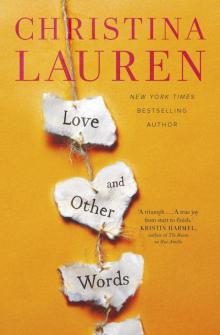 Love and Other Words
Love and Other Words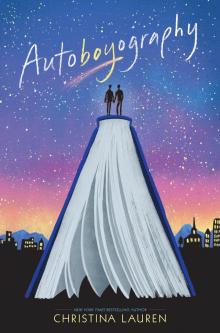 Autoboyography
Autoboyography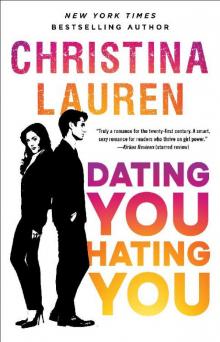 Dating You / Hating You
Dating You / Hating You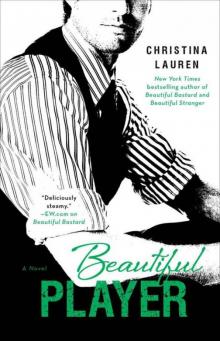 Beautiful Player
Beautiful Player Beautiful Bombshell
Beautiful Bombshell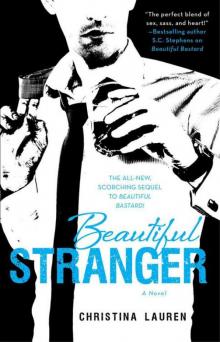 Beautiful Stranger
Beautiful Stranger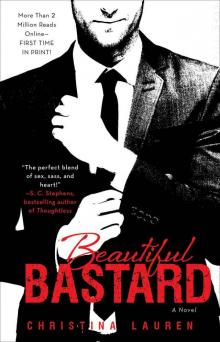 Beautiful Bastard
Beautiful Bastard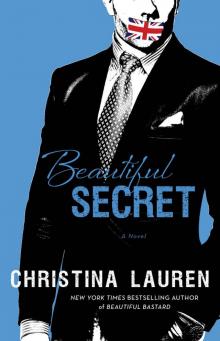 Beautiful Secret
Beautiful Secret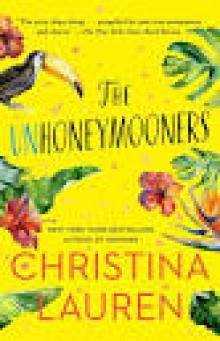 The Unhoneymooners
The Unhoneymooners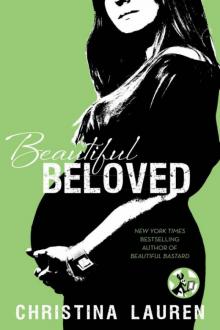 Beautiful Beloved
Beautiful Beloved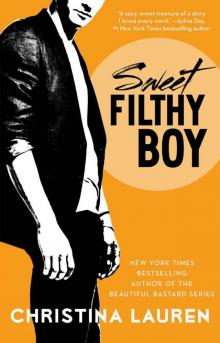 Sweet Filthy Boy
Sweet Filthy Boy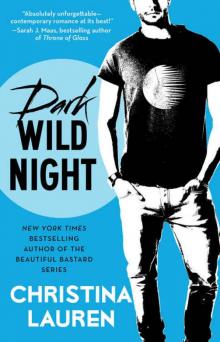 Dark Wild Night
Dark Wild Night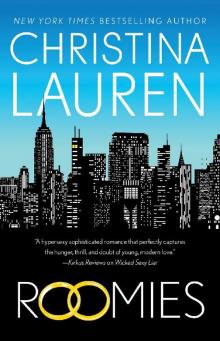 Roomies
Roomies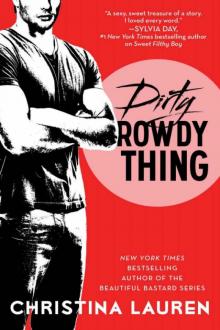 Dirty Rowdy Thing
Dirty Rowdy Thing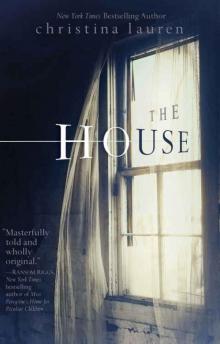 The House
The House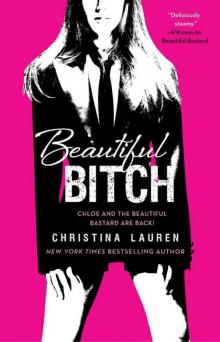 Beautiful Bitch
Beautiful Bitch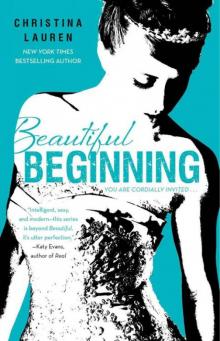 Beautiful Beginning
Beautiful Beginning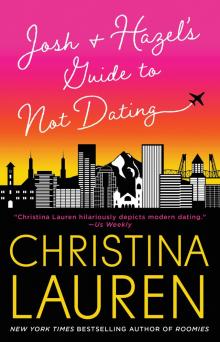 Josh and Hazel's Guide to Not Dating
Josh and Hazel's Guide to Not Dating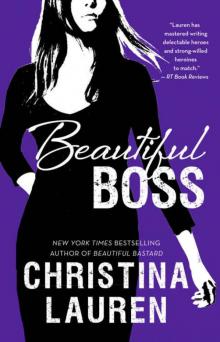 Beautiful Boss
Beautiful Boss In a Holidaze
In a Holidaze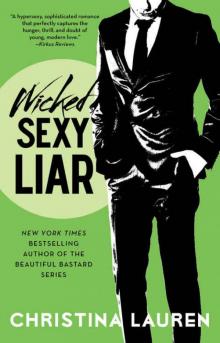 Wicked Sexy Liar
Wicked Sexy Liar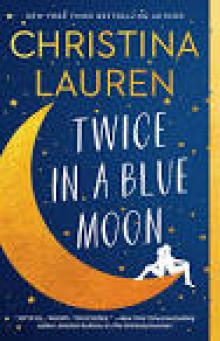 Twice in a Blue Moon
Twice in a Blue Moon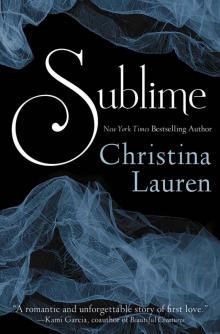 Sublime
Sublime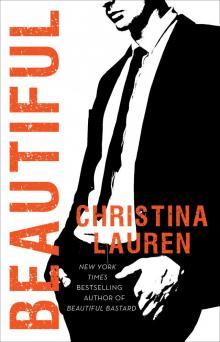 Beautiful
Beautiful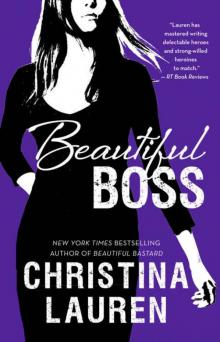 Beautiful Boss (Beautiful #9)
Beautiful Boss (Beautiful #9)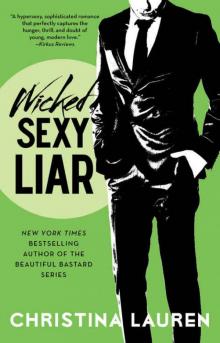 Wicked Sexy Liar (Wild Seasons #4)
Wicked Sexy Liar (Wild Seasons #4)